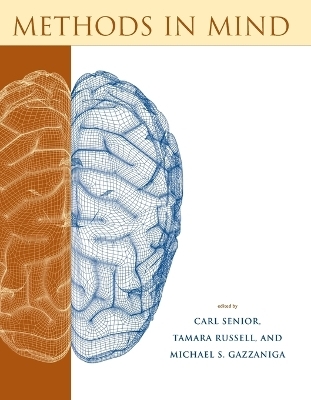
Methods in Mind
Seiten
2009
MIT Press (Verlag)
978-0-262-51343-2 (ISBN)
MIT Press (Verlag)
978-0-262-51343-2 (ISBN)
Experts discuss the wide variety of investigative tools available to cognitive neuroscience, including transcranial magnetic stimulation, neuroscience computation, fMRI, imaging genetics, and neuropharmacology, with particular emphasis on convergence of techniques and innovative uses.
The evolution of cognitive neuroscience has been spurred by the development of increasingly sophisticated investigative techniques to study human cognition. In Methods in Mind, experts examine the wide variety of tools available to cognitive neuroscientists, paying particular attention to the ways in which different methods can be integrated to strengthen empirical findings and how innovative uses for established techniques can be developed. The book will be a uniquely valuable resource for the researcher seeking to expand his or her repertoire of investigative techniques.
Each chapter explores a different approach. These include transcranial magnetic stimulation, cognitive neuropsychiatry, lesion studies in nonhuman primates, computational modeling, psychophysiology, single neurons and primate behavior, grid computing, eye movements, fMRI, electroencephalography, imaging genetics, magnetoencephalography, neuropharmacology, and neuroendocrinology. As mandated, authors focus on convergence and innovation in their fields; chapters highlight such cross-method innovations as the use of the fMRI signal to constrain magnetoencephalography, the use of electroencephalography (EEG) to guide rapid transcranial magnetic stimulation at a specific frequency, and the successful integration of neuroimaging and genetic analysis. Computational approaches depend on increased computing power, and one chapter describes the use of distributed or grid computing to analyze massive datasets in cyberspace. Each chapter author is a leading authority in the technique discussed.
Contributors:
Peyman Adjamian, Peter A. Bandettini, Mark Baxter, Anthony S. David, James Dobson, Ian Foster, Michael Gazzaniga, Dietmar G. Heinke, Stephen Hall, John M. Henderson, Glyn W. Humphreys, Andreas Meyer-Lindenburg, Venkata Mattay, Elisabeth A. Murray, Gina Rippon, Tamara Russell, Carl Senior, Philip Shaw, Krish D. Singh, Marc A. Sommer, Lauren Stewart, John D. Van Horn, Jens Voeckler, Vincent Walsh, Daniel R. Weinberger, Michael Wilde, Jeffrey Woodward, Robert H. Wurtz, Eun Young Yoon, Yong Zhao Carl Senior, Tamara Russell and Michael S. Gazzaniga
The evolution of cognitive neuroscience has been spurred by the development of increasingly sophisticated investigative techniques to study human cognition. In Methods in Mind, experts examine the wide variety of tools available to cognitive neuroscientists, paying particular attention to the ways in which different methods can be integrated to strengthen empirical findings and how innovative uses for established techniques can be developed. The book will be a uniquely valuable resource for the researcher seeking to expand his or her repertoire of investigative techniques.
Each chapter explores a different approach. These include transcranial magnetic stimulation, cognitive neuropsychiatry, lesion studies in nonhuman primates, computational modeling, psychophysiology, single neurons and primate behavior, grid computing, eye movements, fMRI, electroencephalography, imaging genetics, magnetoencephalography, neuropharmacology, and neuroendocrinology. As mandated, authors focus on convergence and innovation in their fields; chapters highlight such cross-method innovations as the use of the fMRI signal to constrain magnetoencephalography, the use of electroencephalography (EEG) to guide rapid transcranial magnetic stimulation at a specific frequency, and the successful integration of neuroimaging and genetic analysis. Computational approaches depend on increased computing power, and one chapter describes the use of distributed or grid computing to analyze massive datasets in cyberspace. Each chapter author is a leading authority in the technique discussed.
Contributors:
Peyman Adjamian, Peter A. Bandettini, Mark Baxter, Anthony S. David, James Dobson, Ian Foster, Michael Gazzaniga, Dietmar G. Heinke, Stephen Hall, John M. Henderson, Glyn W. Humphreys, Andreas Meyer-Lindenburg, Venkata Mattay, Elisabeth A. Murray, Gina Rippon, Tamara Russell, Carl Senior, Philip Shaw, Krish D. Singh, Marc A. Sommer, Lauren Stewart, John D. Van Horn, Jens Voeckler, Vincent Walsh, Daniel R. Weinberger, Michael Wilde, Jeffrey Woodward, Robert H. Wurtz, Eun Young Yoon, Yong Zhao Carl Senior, Tamara Russell and Michael S. Gazzaniga
Carl Senior is University Lecturer in Psychology and a member of the Neurosciences Research Institute at Aston University, Birmingham, U.K. Tamara Russell is Postdoctoral Research Fellow at the Institute of Psychiatry, King's College, London. Michael S. Gazzaniga is Professor of Psychological and Brain Sciences and Director of the SAGE Center for the Study of the Mind at the University of California, Santa Barbara, Codirector of the Kavli Summer Institute in Cognitive Neuroscience, and editor or coeditor of the five previous editions of The Cognitive Neurosciences (all published by the MIT Press).
| Reihe/Serie | Methods in Mind |
|---|---|
| Zusatzinfo | 62 black & white illus., 18 color illus. |
| Verlagsort | Cambridge, Mass. |
| Sprache | englisch |
| Maße | 178 x 229 mm |
| Gewicht | 635 g |
| Themenwelt | Geisteswissenschaften ► Psychologie ► Biopsychologie / Neurowissenschaften |
| Geisteswissenschaften ► Psychologie ► Sucht / Drogen | |
| Geisteswissenschaften ► Psychologie ► Verhaltenstherapie | |
| ISBN-10 | 0-262-51343-9 / 0262513439 |
| ISBN-13 | 978-0-262-51343-2 / 9780262513432 |
| Zustand | Neuware |
| Haben Sie eine Frage zum Produkt? |
Mehr entdecken
aus dem Bereich
aus dem Bereich
Grundlagen, Klinik, Rehabilitation
Buch | Softcover (2024)
Urban & Fischer in Elsevier (Verlag)
56,00 €
Buch | Spiralbindung (2022)
modernes lernen (Verlag)
29,95 €
Grundlagen, Klinik, Therapie und Verlauf der …
Buch | Softcover (2024)
Kohlhammer (Verlag)
84,00 €


